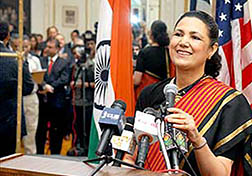
NEW DELHI - The H1-B visa reforms pose a challenge to Indian companies but it will help the country's economy in a direct way, according to Meera Shankar, former Indian ambassador to the US. During a panel discussion on '100 days of Trump's Presidency and India- US relations', Shankar said on Wednesday that there was no new policy in relation with H1-B visa and the US intended to enforce it in "stricter" way to ensure it is used for...

"specialty occupations and not low-end occupations". "We do not know what that policy is going to be. It could involve enhancing threshold of wages. It could involve doing away with system of lottery. But clearly there will be process of disruption and creative engineering of process for Indian companies, which would be a challenge," Shankar said. "I do know that they (US) use it to move up the value scale and do more work offshore in India. So benefits of that to go to our economy in more direct way." Global software major Infosys on Tuesday said it would hire 10,000 American workers in the next two years, a move seen as a fallout of US President Donald Trump's executive order on H1-B visas a fortnight ago. Another panelist Gurcharan Das, author and public intellectual, said the development will lead Indian talent in the US to come back to the homeland and set up business here. "May be Trump is doing a favour to us. It is a boon for Indian companies. Now, many will come back and found start-ups," Das said.
During the discussion, Hardeep Singh Puri, who was Permanent Representative of India to the United Nations, said he did not find similarities between Trump and Indian Prime Minister Narendra Modi.
"The Prime Minister of India has been a Chief Minister of a large state for 12 years and he has hands-on governance per se. He actually demonstrated basic trans-formative changes in (last) three years...Trump comes to governance from the perspective of businessmen," Puri said. Shankar said there should not be any ideological differences between the two leaders as they come from the right wing politics. "Both personalities have positioned themselves as strong political leaders. Trump praised Modi for his victory in Uttar Pradesh, personally congratulated him. This is a trend of the right-wing leaders coming to power across the globe. There should not be any ideological differences between the two. And what India is trying to do in democratic framework is of interest to the United States," Shankar said. Puri said the US "worked against" India's plan to get permanent seat in the United Nations Security Council but said the current BJP government was "handling the issue well".
"(At least) 130 countries are ready to support us. They (US) worked against it. They like the current arrangement. It was wrong on our part to expect the Obama administration to do heavy-lifting in its last two months," Puri said.
"(Now) We are sending our messages across in very calibrated and nuanced manner. And by the time, the Prime Minister is ready to go to Washington, we will have in place an entire canvass of issues, on which we can do some give and take," Puri added.
During the discussion, Hardeep Singh Puri, who was Permanent Representative of India to the United Nations, said he did not find similarities between Trump and Indian Prime Minister Narendra Modi.
"The Prime Minister of India has been a Chief Minister of a large state for 12 years and he has hands-on governance per se. He actually demonstrated basic trans-formative changes in (last) three years...Trump comes to governance from the perspective of businessmen," Puri said. Shankar said there should not be any ideological differences between the two leaders as they come from the right wing politics. "Both personalities have positioned themselves as strong political leaders. Trump praised Modi for his victory in Uttar Pradesh, personally congratulated him. This is a trend of the right-wing leaders coming to power across the globe. There should not be any ideological differences between the two. And what India is trying to do in democratic framework is of interest to the United States," Shankar said. Puri said the US "worked against" India's plan to get permanent seat in the United Nations Security Council but said the current BJP government was "handling the issue well".
"(At least) 130 countries are ready to support us. They (US) worked against it. They like the current arrangement. It was wrong on our part to expect the Obama administration to do heavy-lifting in its last two months," Puri said.
"(Now) We are sending our messages across in very calibrated and nuanced manner. And by the time, the Prime Minister is ready to go to Washington, we will have in place an entire canvass of issues, on which we can do some give and take," Puri added.

 RSS Feed
RSS Feed
